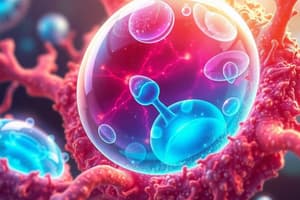Podcast
Questions and Answers
What is a key characteristic of living organisms?
What is a key characteristic of living organisms?
- Lack of cellular composition
- Ability to adapt (correct)
- Inability to grow
- Absence of metabolism
Which type of cells possess membrane-bound organelles?
Which type of cells possess membrane-bound organelles?
- Bacterial cells
- Eukaryotic cells (correct)
- Prokaryotic cells
- Viruses
What is the primary role of DNA in organisms?
What is the primary role of DNA in organisms?
- Transmitting genetic information (correct)
- Facilitating cell division
- Regulating cell membrane
- Creating energy
What mechanism of evolution allows organisms with favorable traits to survive better?
What mechanism of evolution allows organisms with favorable traits to survive better?
What represents the feeding relationships within an ecosystem?
What represents the feeding relationships within an ecosystem?
What term describes the variety of life on Earth?
What term describes the variety of life on Earth?
What is the process of forming new species over time called?
What is the process of forming new species over time called?
Which process is NOT involved in energy creation for cells?
Which process is NOT involved in energy creation for cells?
Flashcards
Biology Definition
Biology Definition
Scientific study of life and living organisms and their interactions.
Cell Definition
Cell Definition
Fundamental unit of life, exhibiting organization and functions.
Eukaryotic Cell
Eukaryotic Cell
Cell with membrane-bound organelles.
Natural Selection
Natural Selection
Signup and view all the flashcards
DNA
DNA
Signup and view all the flashcards
Gene
Gene
Signup and view all the flashcards
Ecosystem
Ecosystem
Signup and view all the flashcards
Biodiversity Importance
Biodiversity Importance
Signup and view all the flashcards
Study Notes
Introductory Biology Concepts
- Biology is the scientific study of life, encompassing all living organisms and their interactions.
- Key characteristics of living organisms include: organization, cellular composition, metabolism, responsiveness, growth, adaptation, and reproduction.
- Organisms are categorized into various levels: atoms, molecules, organelles, cells, tissues, organs, organ systems, organisms, populations, communities, ecosystems, and the biosphere.
- Biological processes and activities are influenced by interactions between organisms and their surroundings.
Cell Biology
- Cells are the fundamental units of life. They exhibit complex organization and specialized functions.
- Eukaryotic cells possess membrane-bound organelles, unlike prokaryotic cells which do not.
- The cell membrane regulates the passage of substances into and out of the cell.
- Cellular respiration utilizes various metabolic pathways to create energy.
- Mitosis and meiosis are cell division processes important for growth and reproduction.
- DNA replication and transcription are critical for genetic information transmission.
Genetics
- Genetics is the study of heredity and variation.
- Genes are segments of DNA that code for proteins.
- DNA is the hereditary material of most organisms.
- Chromosomes contain the genes in a condensed form.
- Genetic mutations can lead to altered traits and characteristics.
- Gene expression describes how DNA is utilized.
Evolution
- Evolution is the change in characteristics of organisms over successive generations.
- Natural selection is a key mechanism of evolution in which organisms with favorable traits are better adapted to their environment.
- Genetic mutations introduce variations that could potentially be advantageous and support natural selection.
- Evolutionary relationships are depicted through phylogenetic trees.
- Speciation is the process of forming new species over time.
Ecology
- Ecology studies the interactions between organisms and their environment.
- Ecosystems comprise biotic and abiotic factors.
- Food webs depict the feeding relationships within an ecosystem.
- Biodiversity refers to the variety of life on Earth.
- Population dynamics explore how populations change over time.
Biodiversity
- Biodiversity encompasses the variety of life at different levels, from genes to ecosystems.
- Biodiversity is essential for ecosystem stability and supporting life.
Classification of Organisms
- Organisms are classified into different taxa based on shared characteristics and evolutionary relationships
- The taxonomic hierarchy (domain, kingdom, phylum, class, order, family, genus, species) reflects these relationships.
- Systems of classification organize the extensive range of living organisms.
General Biological Principles
- Biological principles and processes are often interconnected and complex.
- Systems biology aims to understand the interactions within biological systems.
- Homeostasis is the body's regulation of internal conditions.
- The scientific method involves observation, hypothesis formation, experimentation, and analysis.
- Bioethics addresses ethical issues related to biological discoveries and applications.
Studying That Suits You
Use AI to generate personalized quizzes and flashcards to suit your learning preferences.
Description
This quiz covers fundamental concepts in biology, focusing on the characteristics of living organisms and the classification of life forms. It also delves into cell biology, highlighting the differences between eukaryotic and prokaryotic cells, as well as the processes of cellular respiration and cell division. Test your understanding of these essential topics!




